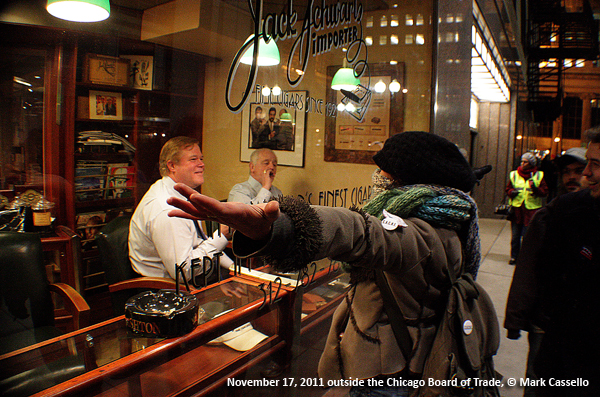
Unless a groundswell of public outrage besieges representatives in Springfield on Tuesday, November 29, 2011, the Illinois State Legislature is likely to approve an enormous tax carve-out designed to benefit two of the most profitable companies in the state, the Chicago Mercantile Exchange (CME) and the Chicago Board of Exchange (CBOE).
This tax carve-out is the most controversial aspect of SB 397, a bill that was introduced originally as SB 405 in the Illinois Senate on February 8, 2011. Public distrust of this legislation has grown steadily in the proceeding months. Occupy Chicago and Make Wall Street Pay Illinois have made defeating this bill a priority in their demonstrations and educational campaigns. Still, the general public remains mostly ignorant about the intricacies of this legislation because it amends huge swaths of Illinois' complex income tax code, and its contents have been obscured by months of political horse-trading.
Essentially, SB 397 makes a large portion of the revenue earned by "federally-regulated exchanges, execution platforms, and clearinghouses" immune from state taxation. More precisely, the bill taxes revenue differently depending on how it is generated. Under this legislation, beginning in 2013, 72.46 percent of revenue generated in electronic trades would be entirely exempt from state income tax. If passed, the bill will grant roughly $100 million in combined tax relief to the CME, CBOE, and Sears Holdings Corporation. This change to the taxation of electronic trading will cut the taxes of the CME and CBOE in half.

For almost a year, the CME and CBOE have bemoaned, bellyached, and blasted the "punitive" increase in the Illinois corporate income tax rate. In January 2011, Illinois temporarily raised the state's corporate tax rate from 4.8 to 7 percent. This, combined with the 2.5 percent Personal Property Tax Replacement Income Tax, brings the effective corporate tax rate in Illinois to 9.5 percent, the third highest in the nation.
Citing a high tax burden, representatives for the CME and CBOE have suggested that they may relocate some or all of their employees to other locations. However, when testifying in favor of SB 397 to legislators in Springfield earlier this month, executive chairman of CME Group, Terrence Duffy, appeared more conciliatory: "We like Chicago. We love Illinois. We want to remain a big part of it."
Duffy's change of heart likely owes to the near-imminent passage of SB 397. Introduced by Senate President John Cullerton and standoffishly sponsored by House Majority Leader Barbara Flynn Currie, SB 397 amends the state's income tax law with provisions designed to directly benefit these two corporations. If SB 397 passes, the CME and CBOE will pay $110 million less in taxes next year. It is also worthwhile to note that the multimillion-dollar tax cut included in SB 397 comes in addition to $15 million in TIF funds already allocated to the CME by the Chicago City Council in December 2010.
These corporations are generating incredible profits. In 2010, the CME and the CBOE earned combined profits of over $1 billion. But the CME feels that paying an effective tax rate of 8.9 percent, or $108 million in taxes to the state of Illinois is too much. Currently, these corporations account for about 6 percent of the state's total income tax revenue.
The complaints of unfairness lodged by the CME and CBOE have some basis in truth. The Illinois Tax Code is riddled with carve-outs, loopholes, and exemptions that completely absolve some corporations from paying any state income tax whatsoever. The Sun-Times reports that "data from Gov. Pat Quinn's office showed that in the last year, it has negotiated tax incentives for 48 companies that have promised to create or retain jobs." But rather than demanding tax reform to make the system more equitable for everyone, the CME and CBOE wield their economic might to forge their own exception to fundamentally flawed state tax laws.
Tragically comic both in its boldness and its timing, SB 397 pads the coffers of two incredibly prosperous corporations while vital services are being slashed to the most vulnerable populations in Illinois. Similarly, SB 397 mocks the thousands of small businesses across the state who silently and dutifully pay state taxes and ask for no special treatment. In the face of this reality, it is positively stunning that corporations like the CME and CBOE have the gall to exhort the Illinois legislature for millions in tax breaks.
But perhaps what is most alarming about SB 397 is its shortsightedness. Only a small fraction of the revenue generated by electronic trades will be taxed while all of the revenue generated on the trading floor will be taxable. Taxing electronic trades at a fraction of the rate of floor trading could have a number of unintended consequences.
First, an even greater portion of the CME and CBOE's business will shift to electronic trading. This seems inevitable since SB 397 will make electronic trades instantly more profitable. Because 100 percent of the revenue from trades conducted on the trading floor will be taxed, the CME and CBOE are likely to reduce the number of floor trades. This will be done by eliminating the jobs of hundreds of floor traders. Ironically, the traders who once mocked Occupy Chicago supporters may soon find themselves marching in tandem with them.
Second, the increased profitability of electronic trades due to their reduced tax status will mitigate some of the risk associated with these trades. Consequently, SB 397 may encourage traders to engage in riskier -- even systemically dangerous -- trades.
As the vote on SB 397 looms, opponents are rallying to defeat the bill. David Orlikoff, a supporter of Occupy Chicago who organized a protest against SB 397 asks that "citizens call these bill sponsors and their own representatives to let them know... that citizens will hold them fully accountable for their actions." A protest is scheduled at the state assembly on Tuesday, November 29, 2011 organized by Occupy Springfield.
This post has been modified since its original publication.
